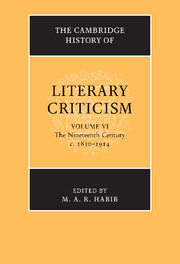Book contents
- The Cambridge History of Literary Criticism
- Series page
- The Cambridge History of Literary Criticism
- Copyright page
- Contents
- Notes on contributors
- Acknowledgements
- Introduction
- I Literary criticism as an institution
- II National developments in literary criticism
- III Critical movements and patterns of influence
- IV Later nineteenth-century developments: Realism, Naturalism, Symbolism and Decadence
- V Some major critics of the period
- VI Genre criticism
- VII Literature and other disciplines
- 30 Literary criticism and models of science
- 31 Literature and the arts
- 32 Biblical scholarship and literary criticism
- Select bibliography and further reading
- Index
32 - Biblical scholarship and literary criticism
from VII - Literature and other disciplines
Published online by Cambridge University Press: 05 February 2013
- The Cambridge History of Literary Criticism
- Series page
- The Cambridge History of Literary Criticism
- Copyright page
- Contents
- Notes on contributors
- Acknowledgements
- Introduction
- I Literary criticism as an institution
- II National developments in literary criticism
- III Critical movements and patterns of influence
- IV Later nineteenth-century developments: Realism, Naturalism, Symbolism and Decadence
- V Some major critics of the period
- VI Genre criticism
- VII Literature and other disciplines
- 30 Literary criticism and models of science
- 31 Literature and the arts
- 32 Biblical scholarship and literary criticism
- Select bibliography and further reading
- Index
Summary
Keywords
- Type
- Chapter
- Information
- The Cambridge History of Literary Criticism , pp. 602 - 622Publisher: Cambridge University PressPrint publication year: 2013

